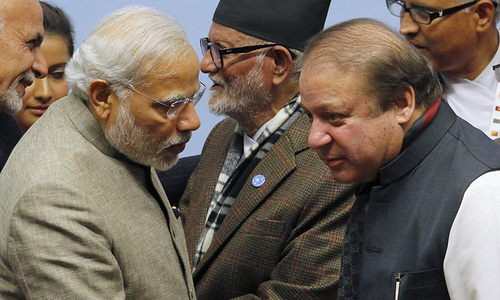Pakistan accepts, India rejects US peace talks offer

WASHINGTON: The US offer to help de-escalate tensions between India and Pakistan led to a chain of reactions on Tuesday, as Pakistan welcomed the suggestion, India rejected it and the US State Department rephrased the offer to facilitate talks to accommodate both.
“Any positive role that the US plays to bring peace and stability in South Asia can serve the region well,” said Pakistan’s Washington envoy Aizaz Ahmad Chaudhry, hours after Nikki Haley, the US ambassador to the United Nations, made the offer.
“It’s absolutely right that this administration is concerned about the relationship between India and Pakistan and very much wants to see how we de-escalate any sort of conflict going forward,” she said while addressing a news conference in New York on Monday after the US assumed the presidency of the United Nations Security Council for the month of April.
Editorial: An opportunity for Pak-India ties
Ambassador Haley, who is of Indian ancestry, also hinted that the Trump administration would participate in the talks aimed at resolving differences between South Asia’s two neighbours.
“I would expect that the [Trump] administration is going to be in talks and try and find its place to be a part of that because it’s concerned about the situation,” she said.
Ambassador Chaudhry told Dawn in Washington that Pakistan was interested in such efforts because it “wants good neighbourly relations with India".
A State Department spokesperson, when contacted by Dawn, explained the US position on facilitating talks between the two countries.
US ambassador to UN hints that Trump administration will participate in talks aimed at resolving differences between the two countries
“We believe India and Pakistan stand to benefit from practical cooperation. We encourage India and Pakistan to engage in direct dialogue aimed at reducing tensions,” the spokesperson said.
The US official also explained why Washington wanted to promote good neighbourly relations between India and Pakistan. “The normalisation of relations between Pakistan and India is vital to both countries and the region. Steps that initiate closer regional economic ties can also create jobs, lower inflation and increase energy supply,” the official said.
The last sentence of the statement, however, stresses the stated US policy, which is close to India’s stance on this issue that all differences between India and Pakistan should be resolved bilaterally and the United States could only encourage them to talk.
“We have and continue to encourage India and Pakistan to work together to resolve any differences,” the US official said.
India has consistently ruled out third party mediation, including by the UN or the US.
Pakistan, however, welcomes international mediation and regularly raises the Kashmir issue at different UN fora. Islamabad also encourages the US and the UN to help resolve its disputes with India.
On Tuesday, Gopal Baglay, a spokesman for the Indian Ministry of Foreign Affairs, snubbed Ambassador Haley for hinting that Washington was ready to mediate.
“The government’s position for bilateral redressal of all India-Pakistan issues in an environment free of terror and violence hasn’t changed,” he said, although in the same statement he also asked the international community to persuade Pakistan to stop alleged cross-border terrorist attacks from its soil.
“We, of course, expect the international community and organisations to enforce international mechanisms and mandates concerning terrorism emanating from Pakistan, which continues to be the single biggest threat to peace and stability in our region and beyond,” he said.
Also on Tuesday, the Indian media ran an interview with a senior US official who said that last week India and the United States did talk about Pakistan.
The US official told the PTI news agency that the alleged presence of terror safe havens in Pakistan, aggressive Chinese behaviour and the Afghanistan situation dominated last month’s meeting between US Defence Secretary James Mattis and Indian National Security Adviser Ajit Doval.
This was the highest-level interaction of the new US defence secretary with India.
The US official, who works for the Department of Defence, said Pakistan and Afghanistan were the two major topics of discussion between the two leaders. “They talked about Pakistan,” the official said, adding that Mr Doval “talked more” on the issue than Secretary Mattis.
“There was not a whole lot specifics. We have a number of concerns with respect to Pakistan ... counter-terrorism, nuclear weapons” and these were also a cause of concern for India because “it’s an important player in the region and the world,” the US official said.
The US would like to see Pakistan in a situation with it where they could have a productive relationship, the official added.
Secretary Mattis “recognises the important role that it plays in the region and the world and its unique position vis-a-vis Pakistan, vis-a-vis China,” the official said.
Mr Doval began a five-day visit to Washington on March 20, during which he also met the Homeland Security Secretary Gen John Kelly and US National Security Adviser Lt Gen H.R. McMaster.
Masood Haider adds from New York: Nikki Haley, who is seen as a rising star in the Trump administration, said at the press conference: “We (the Trump administration) very much think that we should be proactive in the way that we are seeing tensions rise and conflicts start to bubble up. And so we want to see if we can be a part of that. So I think that that will be something that you will see members of the National Security Council participate in but also wouldn’t be surprised if the president participates in that as well.”
Ms Haley took over the monthly rotating presidency of the UN Security Council on April 1, and has declared that her focus for the next month will be peacekeeping reform and human rights. The agenda is already proving controversial, and as a result she has not been able to agree a timetable for the events she wants to hold.
Published in Dawn, April 5th, 2017












































